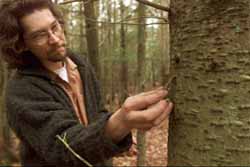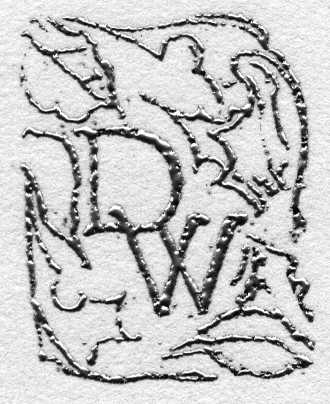|
Detroit News Michigan, Thursday, December 7th, 2000 Bookbinder
writes, sets type, publishes own tomes
Insurance settlement leads to limited edition one-man printing firm
 Chad
Pastotnik, proprietor of Deep Wood Press in Mancelona, Mich., collects
sap from a fir tree in the woods near his studio. He uses the sap in some
of the glues he makes for binding books. Chad
Pastotnik, proprietor of Deep Wood Press in Mancelona, Mich., collects
sap from a fir tree in the woods near his studio. He uses the sap in some
of the glues he makes for binding books.
Photo -Valica Boudry / Associated Press
By Pat Shellenbarger / Associated Press MANCELONA -- The branches and roots of the cedars along the river are a labyrinth and an inspiration to Chad Pastotnik. When he takes a break from his shop and wanders along the Cedar River northwest of Mancelona, as he does most days, he sees forms, human and animal, in the trees. "All those things you see in my prints, trees really do that," he said one morning, after the fog had lifted and he ventured out. "Just look around you. Look at this stuff. That's why I moved up here. This is my subject matter." Ask him his occupation, and Pastotnik might answer artist, printer or bookbinder. In truth, he is all three. He illustrates, designs, typesets, prints and binds limited-edition books that sell for hundreds of dollars. Sometimes he writes them. "It's difficult to describe what I do, because there's no reference point," he said. "I'm a jack of all trades, master of none." Whatever he does, Pastotnik does it in a small shop he calls Deep Wood Press that he built next to his cottage in a peaceful forest of cedar, hemlock and white birch. He works when he wants to work, which usually isn't until afternoon and late into the night. "I usually don't know what day it is. If I didn't have my post office box, I'd never go into town. I don't function too well in society, I guess." What brought the 31-year-old Grand Valley State University graduate to this remote spot was a combination of fate and determination. After graduating from high school in Cadillac, he enrolled at Grand Valley State to study art, mainly painting. Then he discovered printmaking. While in college, he rented rooms in Grand Rapids' Cherry Hill neighborhood. "After five years, I knew I wanted to get out of the city," he said. "Anybody who can live in a box with somebody below and somebody above -- I can't do that. Nothing against the city. It's the cradle of civilization. But it's a cradle that's been rocked too hard. "It took me moving to the city to appreciate the finer things. My dream was to get out of the city and find a beautiful place like this to just do my thing. I didn't think I'd be able to do it that soon." December 1990, Pastotnik drove west on Lake Michigan Drive, heading for the Allendale campus, where an exhibit of his prints would open that evening, the final step in his pursuit of a bachelor of fine arts degree in printmaking. Near Standale, an oncoming car went out of control on ice and hit his car head-on. The other driver was killed, and Pastotnik's head went through the windshield. His face was severely lacerated, and for two months he was blind, but he slowly regained his sight. With a modest insurance settlement, "I thought of traveling the world and all that," he said. "And then I was fishing and saw this 'for sale' sign, and I had exactly that much money." He bought the cottage and 3 1/2 acres on the Cedar River, surrounded by private and state forest. He designed and built the shop himself, was given an ancient letterpress printing press and in 1991 opened Deep Wood Press. In the years since, he's added five more secondhand presses and related equipment, some of it not much more advanced than what Gutenberg used. His newest press is 60 years old. He got it from a New Jersey monastery. His oldest -- all cast iron and gears -- dates from 1853. "I've had offers from a couple of museums that would like to have it for their collections," Pastotnik said, "but I hold onto it. It's beautiful." It's not that he has anything against modern equipment -- he has a computer, a scanner and laser printer in his shop. But nothing can match the quality of handset type, he said. A decade or so ago, he taught himself book binding, and his work evolved from making individual prints to book printing. Some he wrote himself, such as his collection of poetry titled Green Man. Other poets and authors -- some well-known, some not -- asked him to print their books. He engraves the printing plates by hand, designs the pages, hand sets the type, prints the pages and binds them with handmade covers, some of leather, some of cedar and other natural materials. Most of his press runs are fewer than 200 copies. He sells them -- some for as much as $1,500 -- to museums, university libraries and private collectors who appreciate the artistic quality of a fine press book. Demand for his services has grown so that he can be selective, generally accepting only the books of writers he admires. Not that he makes much money. "I'm at the poverty level," he said. "I made less than 12 grand last year. I just live in paradise. Equipment-wise, I'm all set. Now come the good years. The lean years are at an end." For months, he's been designing
a book of essays, A Passage of Seasons, by nature writer Barry Lopez. He's
waiting for the handmade paper to arrive from the Czech Republic so he
can print it. In his shop, Pastotnik opened a drawer and selected
the individual letters he would need for a job. He picked out thin strips
of lead to use as spacing between lines of type. After years of setting
type by hand, he can read a form of metal type backward nearly as fast
as most people can read a printed page forward.
Back
to Contact Information and Resume
|
